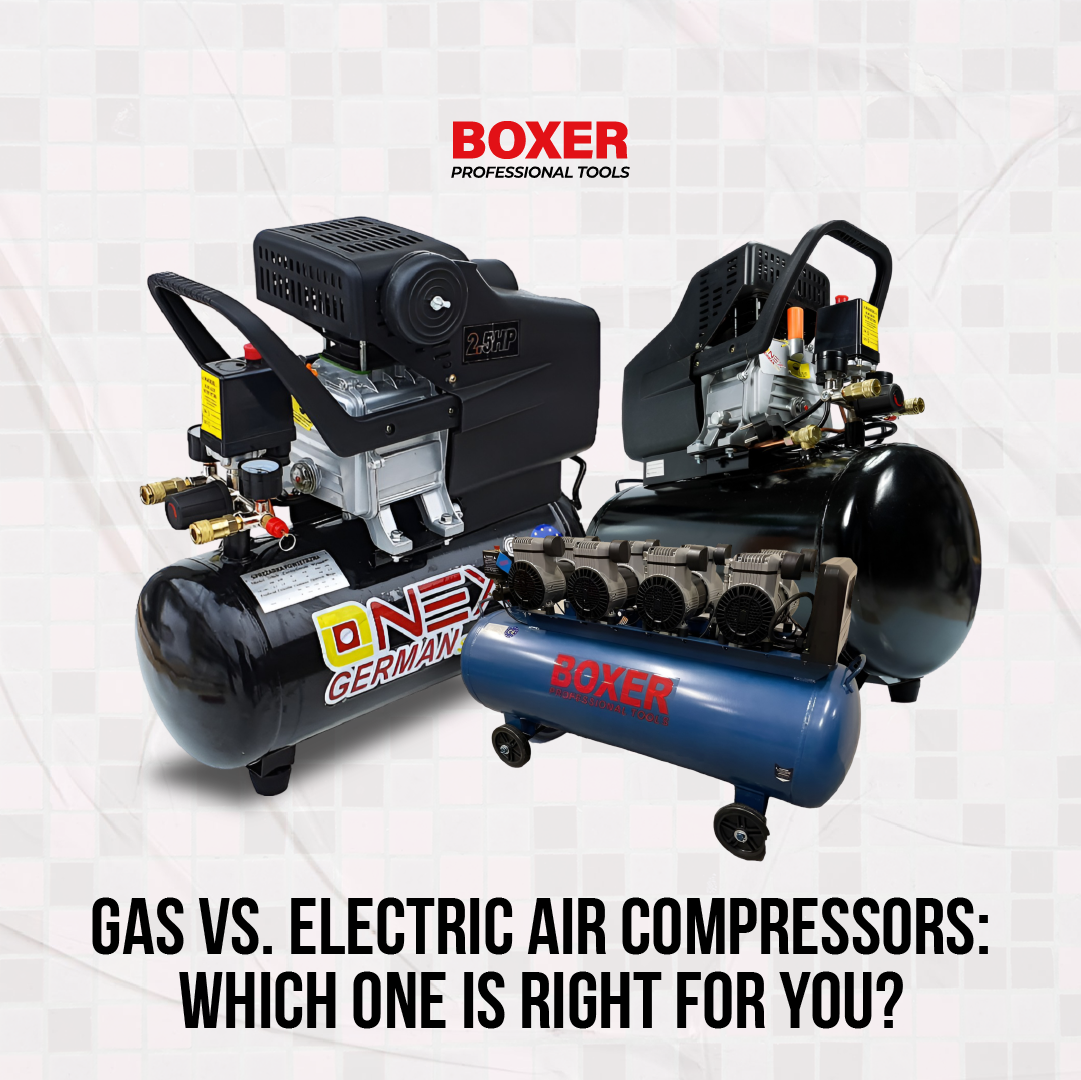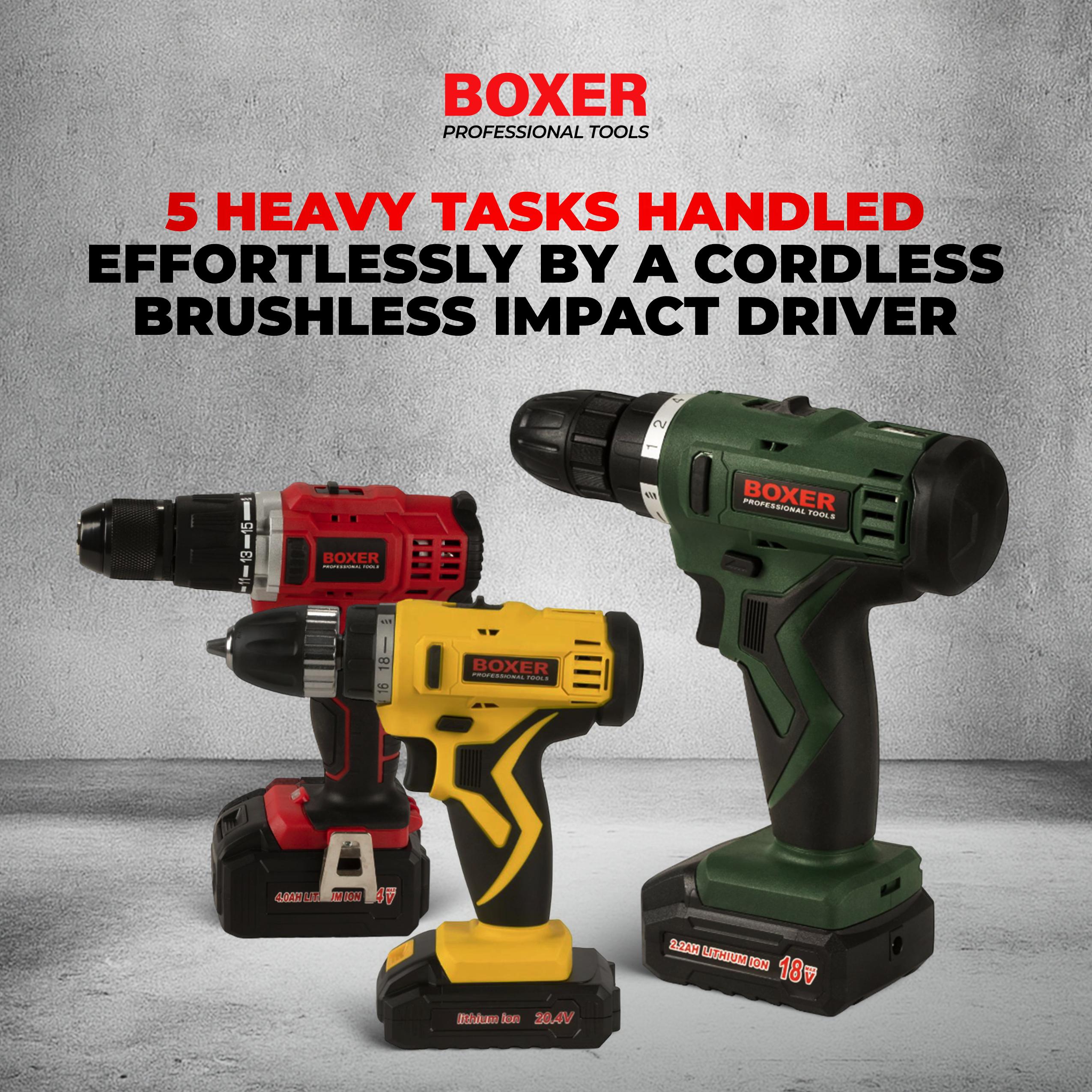
Gas vs. Electric Air Compressors: Which One is Right for You?
When it comes to selecting an air compressor for your workshop, garage, or job site, the decision often boils down to choosing between a gas or electric model. Each type of air compressor has its own set of advantages and disadvantages, and the right choice depends on a variety of factors, including your specific needs, work environment, and budget. In this comprehensive guide, we'll delve into the differences between gas and electric air compressors, their benefits and drawbacks, and how to determine which one is best suited for your needs. By the end of this article, you'll have a clear understanding of which type of air compressor is right for you, with insights from Boxer Tools, a leading name in the industry.
Understanding Air Compressors
what is air compressor?
Air compressors are versatile tools used in various applications, from powering pneumatic tools and inflating tires to painting and cleaning. They work by converting power into potential energy stored in pressurized air. This energy can then be released to perform a variety of tasks. Air compressors come in various types and sizes, but the primary focus of this article is on gas and electric models.
Gas Air Compressors: Power and Portability
Gas air compressors are powered by gasoline engines, making them ideal for outdoor and remote applications where electrical power may not be readily available. Here are some key benefits and drawbacks of gas air compressors:
Benefits of Gas Air Compressors
- Portability: One of the most significant advantages of gas air compressors is their portability. Since they do not rely on an electrical power source, they can be used in remote locations and job sites where electricity is unavailable. This makes them ideal for construction sites, agricultural settings, and outdoor projects.
- Power: Gas air compressors are typically more powerful than their electric counterparts. They can provide higher CFM (cubic feet per minute) ratings and PSI (pounds per square inch) levels, making them suitable for heavy-duty applications that require a substantial amount of air power.
- Versatility: Gas air compressors can be used in a wide range of environments and conditions. They are not restricted by the availability of electrical outlets or the need for extension cords, making them versatile tools for various tasks.
- Continuous Operation: Gas air compressors can run continuously as long as they have fuel. This is particularly beneficial for long-term projects that require sustained air power without interruptions.
Drawbacks of Gas Air Compressors
- Noise: Gas air compressors tend to be louder than electric models due to the noise generated by the gasoline engine. This can be a significant drawback in residential areas or noise-sensitive environments.
- Emissions: Gas engines produce emissions, which can be a concern for indoor use or in areas with strict environmental regulations. Proper ventilation is required when using gas air compressors indoors to prevent the buildup of harmful fumes.
- Maintenance: Gas engines require regular maintenance, including oil changes, spark plug replacements, and air filter cleaning. This can add to the overall cost and time required to keep the compressor in good working condition.
- Cost of Fuel: The cost of gasoline can add up over time, making gas air compressors more expensive to operate compared to electric models. Additionally, you need to ensure a steady supply of fuel to keep the compressor running.
Electric Air Compressors: Convenience and Efficiency
Electric air compressors are powered by electric motors and are commonly used in indoor settings where electrical power is readily available. Here are some key benefits and drawbacks of electric air compressors:
Benefits of Electric Air Compressors
- Quiet Operation: Electric air compressors are generally quieter than gas models, making them suitable for indoor use and noise-sensitive environments. This is particularly important in residential areas or when working in confined spaces.
- Low Emissions: Since electric air compressors do not produce emissions, they are environmentally friendly and safe for indoor use. There are no concerns about harmful fumes or the need for ventilation.
- Ease of Use: Electric air compressors are typically easier to use and maintain compared to gas models. They require less maintenance, as there are no oil changes or spark plug replacements needed. Simply plug them in, and they are ready to go.
- Cost-Effective Operation: Operating an electric air compressor can be more cost-effective over time, as there are no fuel costs involved. Additionally, they tend to have a lower initial purchase price compared to gas models.
- Instant Start: Electric air compressors offer instant start-up without the need for pulling a starter cord, making them convenient and user-friendly.
Drawbacks of Electric Air Compressors
- Limited Portability: Electric air compressors are limited by the availability of electrical outlets. They require access to a power source, which can be a drawback in remote or outdoor locations where electricity is not available.
- Power Limitations: Electric air compressors may not provide the same level of power as gas models. They are typically suitable for light to medium-duty applications but may struggle with heavy-duty tasks that require high CFM and PSI ratings.
- Cord Management: The need for extension cords can be cumbersome and restrict mobility. Long extension cords can also lead to voltage drops, affecting the performance of the compressor.
- Dependence on Electricity: In the event of a power outage, an electric air compressor becomes unusable. This can be a significant drawback for critical tasks that require uninterrupted air power.
Choosing the Right Air Compressor: Key Considerations
Now that we have explored the benefits and drawbacks of both gas and electric air compressors, let's discuss the key considerations to help you determine which type is right for you. By evaluating your specific needs and work environment, you can make an informed decision that aligns with your requirements.
Application and Usage
Consider the primary applications and usage of the air compressor. If you need a compressor for outdoor projects, construction sites, or remote locations, a gas air compressor may be the better choice due to its portability and power. On the other hand, if you primarily work indoors or in a workshop with readily available electrical power, an electric air compressor may be more suitable.
Power Requirements
Evaluate the power requirements of the tools and equipment you plan to use with the air compressor. Heavy-duty tools that demand high CFM and PSI ratings may require the power provided by a gas air compressor. For light to medium-duty applications, an electric air compressor should suffice.
Noise Levels
Consider the noise levels of the air compressor, especially if you work in noise-sensitive environments or residential areas. Electric air compressors are generally quieter and may be a better option for indoor use.
Environmental Impact
If environmental concerns are a priority, an electric air compressor is the more eco-friendly option, as it produces no emissions. Gas air compressors, while powerful, emit fumes that can be harmful in enclosed spaces.
Maintenance and Operating Costs
Think about the maintenance and operating costs associated with each type of air compressor. Gas air compressors require regular maintenance and have ongoing fuel costs, while electric models are typically easier to maintain and more cost-effective to operate.
Portability
Assess the importance of portability for your work. If you need to move the air compressor frequently or work in locations without electrical power, a gas air compressor's portability is a significant advantage.
Budget
Finally, consider your budget. Electric air compressors tend to have a lower initial purchase price and lower operating costs, making them a cost-effective option for many users. However, if your work demands the power and portability of a gas air compressor, it may be worth the investment.
Boxer Tools: Your Trusted Partner in Air Compressors
When it comes to selecting a reliable air compressor, Boxer Tools stands out as a trusted name in the industry. With a wide range of gas and electric air compressors, Boxer Tools offers high-quality products designed to meet the diverse needs of professionals and DIY enthusiasts alike.
Boxer Tools Electric Air Compressors
Boxer Tools' electric air compressors are designed for efficiency and convenience. These compressors feature quiet operation and low maintenance requirements, making them perfect for indoor use and workshops. Boxer Tools' electric air compressors offer reliable performance with various models to suit different power needs and applications.
Why Choose Boxer Tools?
- Quality and Reliability: Boxer Tools is known for manufacturing high-quality air compressors that are built to last. Each product undergoes rigorous testing to ensure reliability and performance.
- Wide Selection: Whether you need a gas or electric air compressor, Boxer Tools has a diverse range of models to choose from, catering to different power requirements and applications.
- Customer Support: Boxer Tools is committed to providing excellent customer support. Their knowledgeable team is available to assist with product selection, troubleshooting, and maintenance tips.
- Innovation: Boxer Tools continually invests in research and development to bring innovative features and technologies to their air compressors, ensuring that users have access to the latest advancements in the industry.
Making the Right Choice
Choosing between a gas and electric air compressor ultimately depends on your specific needs and work environment. Gas air compressors offer unmatched portability and power, making them ideal for remote and heavy-duty applications. However, they come with higher noise levels, emissions, and maintenance requirements. Electric air compressors, on the other hand, provide quiet operation, low emissions, and ease of use, making them suitable for indoor and medium-duty tasks.
By carefully evaluating your application, power requirements, noise considerations, environmental impact, maintenance needs, portability, and budget, you can make an informed decision that best suits your needs. And with Boxer Tools' extensive range of high-quality gas and electric air compressors
Copyright © 2026 Boxertools | Powered By Orance Media Group








